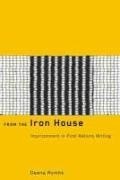Read more
In
From the Iron House: Imprisonment in First Nations Writing, Deena Rymhs identifies continuities between the residential school and the prison, offering ways of reading "the carceral" - that is, the different ways that incarceration is constituted and articulated in contemporary Aboriginal literature. Addressing the work of writers like Tomson Highway and Basil Johnston along with that of lesser-known authors writing in prison serials and underground publications, this book emphasizes the literary and political strategies these authors use to resist the containment of their institutions.
The first part of the book considers a diverse sample of writing from prison serials, prisoners' anthologies, and individual autobiographies, including
Stolen Life by Rudy Wiebe and Yvonne Johnson, to show how these works serve as second hearings for their authors - an opportunity to respond to the law's authority over their personal and public identities while making a plea to a wider audience. The second part looks at residential school narratives and shows how the authors construct identities for themselves in ways that defy the institution's control. The interactions between these two bodies of writing - residential school accounts and prison narratives - invite recognition of the ways that guilt is colonially constructed and how these authors use their writing to distance themselves from that guilt.
Offering new ways of reading Native writing,
From the Iron House is a pioneering study of prison literature in Canada and situates its readings within international criticism of prison writing. Contributing to genre studies and theoretical understandings of life writing, and covering a variety of social topics, this work will be relevant to readers interested in indigenous studies, Canadian cultural studies, postcolonial studies, auto/biography studies, law, and public policy.
List of contents
Table of Contents for
From the Iron House: Imprisonment in First Nations Writing by Deena Rymhs
AcknowledgementsIntroductionPart I: Genre in the Institutional Setting of the PrisonBarred Subject: Leonard Peltier' s Prison WritingsJames Tyman's Inside Out: An Autobiography by a Native CanadianAuto/biographical Jurisdictions: Collaboration, Self-Representation, and the Law in Stolen Life: The Journey of a Cree WomanPrison Collections and PeriodicalsPart II: Genre in the Institutional Setting of the Residential SchoolA Residential School Memoir: Basil Johnston's Indian School Days"It is the law": Disturbing the Authoritative Word in Tomson Highway's Kiss of the Fur QueenHated Structures and Lost Talk: Making Poetry Bear the BurdenAutobiography as Containment: Jane Willis's Geniesh: An Indian GirlhoodConclusionWorksIndex
About the author
Deena Rymhs is an assistant professor of English at St. Francis Xavier University in Nova Scotia. She has published essays on Canadian literature with a focus on indigenous authors and narratives of incarceration.

